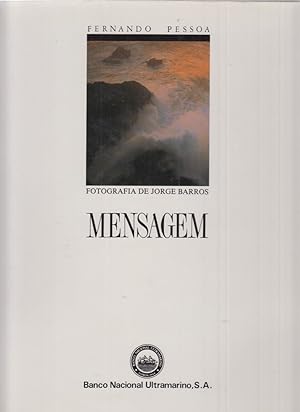Mensagem by Pessoa Fernando Barros Jorge (2 results)
FeedbackSearch filters
Product Type
- All Product Types
- Books (2)
- Magazines & Periodicals (No further results match this refinement)
- Comics (No further results match this refinement)
- Sheet Music (No further results match this refinement)
- Art, Prints & Posters (No further results match this refinement)
- Photographs (No further results match this refinement)
- Maps (No further results match this refinement)
- Manuscripts & Paper Collectibles (No further results match this refinement)
Condition
- All Conditions
- New (No further results match this refinement)
- Used (2)
Binding
- All Bindings
- Hardcover (1)
- Softcover (No further results match this refinement)
Collectible Attributes
- First Edition (No further results match this refinement)
- Signed (No further results match this refinement)
- Dust Jacket (1)
- Seller-Supplied Images (1)
- Not Print on Demand (2)
Free Shipping
- Free Shipping to United Kingdom (No further results match this refinement)
Seller Rating
-
Mensagem (texto en portugués, francés, alemán, chino e inglés)
Seller: Libros El Trovador, TALAVERA DE LA REINA, TO, Spain
Lisboa, Edições ASA, 1991. Diseño de J. Machado. Prefácio de José Augusto Seabra. Traduç. Francesa de Bernard Sesé. Traduç. Alemã de Georg Rudolf Lind. Traduç. Chinesa de Jin Guo Ping. Traduç. Inglesa de Edwin Honig e Susan M. Brown. 30x24 cm. 272 p. Tela, sobrecubierta. Buen estado. Primera edición. (Ref. N. 010).
-
Mensagem. Fernando Pessoa. Fotografia de Jorge Barros. 125 Anos .
Published by Banco Nacional Ultramarino S.A. / (Lissabon), 1989
Seller: Fundus-Online GbR Borkert Schwarz Zerfaß, Berlin, Germany
Condition: Gut. XII; 243 Seiten; zahlr. farb. Illustrationen (Fotografie); 30 cm. Gutes Exemplar; Umschlag stw. berieben. - Mit hs. Karte von Miguel Cadilhe (Ministro das Financas) // Spanisch, französisch; englisch u.a. // Design Joao Machado; Prefacio Jose Augusto Seabra. - Die Banco Nacional Ultramarino (Nationale Überseebank) ist eine portugiesische Bank, die vor allem in den ehemaligen Kolonien Portugals tätig ist. Sie ist eine Tochter der öffentlichen, portugiesischen Bank Caixa Geral de Depósitos. . (wiki) // Fernando Pessoa (* 13. Juni 1888 in Lissabon; 30. November 1935 ebenda), eigentlich Fernando António Nogueira de Seabra Pessoa, war ein portugiesischer Dichter, Schriftsteller, Angestellter eines Handelshauses und Geisteswissenschaftler. Er verfasste seine Werke hauptsächlich unter den drei Heteronymen Alberto Caeiro, Ricardo Reis, Álvaro de Campos und dem Halb-Heteronym Bernardo Soares. Weitere Heteronyme Pessoas waren die Brüder Charles James und Alexander Search. Pessoa gilt neben Luís de Camões als bedeutendster Lyriker Portugals; er ist einer der wichtigsten Dichter in portugiesischer Sprache und gehört zu den bedeutendsten Autoren des 20. Jahrhunderts. . (wiki) // Destiny for ever hidden, that of this Message circling from sign to sign, from tongue to tongue, in the eternal return of the myth made Word, which we can read in new occidental and oriental versions, from the romance languages, beginning with the mother and father language of Pessoa, to the English of his adoption to the far-off Chinese ideograms. Herein lies the proof that indeed the God of the poet, infinite 'agent' of History, 'speaks all languages', it having been for this that he gave us the signs, as sacred and mysterious as Himself. Aloof face of a Europe looking like a sphinx, immutable, with its 'Greek eyes' passing over the civilizations and the centuries, from the Mediterranean to the Atlantic, in an ancestral memory of its origins, in search of the 'future of the past'-such is, in these Supra-Lusiads of a Supra-Camoes, 'Portugal made Universe', which through the dream and the work of its heroes and navigators set out on the discovery of a Fifth Empire of 'pax in excelsis', foreseen as the Hidden in the fog of 'Ages' (Tempos'). The whole structure of the book, which Pessoa said constituted 'just one poem', where appear architextually the various classic genres-lyric, epic, dramatic-interlaced in a poetic modernity in execution, is presented as a cipher in its cabalistic numbers from which in flight we would try to decipher a univocal sense. The hermeneu-tic of the interpretation of these symbols-with their esoteric five qualities: 'sympathy', 'intuition', 'intelligence', 'understanding' and 'wit'-will never be anything more than the thickening of a 'darkness visible', like the prophecies whose 'Warnings', from Bandarra to Vieira and the latter to Pessoa, leave us suspended from the 'Hour' ('Hora'). By its Latin origin, which is inscribed from the epigraph to the epilogue, the Mensagem is propounded, all of it, as an anagram-matic text: mens agitat molem. Yes, it is spirit which moves matter, it is that which fills the sails of the 'ships of the initiation', which across the 'Portuguese Sea' sets out for the 'new discoveries', since 'navigating is necessary', continuing to sail 'the universal sea and the yearning'. From that initiating voyage, what course is to be set, if not that which, from one sign to the next is its plural wake, which may be as much that of languages, of translation into translation, as that of any language in which the same mystery is read? That multiple, in-tersemiotic path, which Charles Sanders Peirce called the chain of interpreters, ad infinitum, is that which Jorge Barros takes with his beautiful photograms of kaleidoscopic images: landscapes, paintings, sculptures, monuments, emblematic traces of a planetary circumnavigation, like the one the Portuguese undertook and Pessoa put forward in his oecumenical Message. - Jose Augusto Seabra (Seite 5) Sprache: Deutsch Gewicht in Gramm: 2200 Originalleinen mit farb. illustr. OUmschlag.Schutzumschlag.



